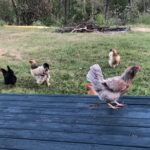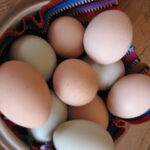Clouds darkened in the late morning of August 10, 2020, as a thunderstorm warning was broadcast by radio stations. That’s common during Iowa summers, so we weren’t overly concerned. A half-hour later, a roaring wind engulfed Cedar Rapids. It was a derecho bearing winds up to 140 miles an hour.
We watched our young trees bend before the tempest. Then came the terrible part.
First, our black oaks tumbled down. Then, the black cherries and hackberries tumbled down before the wind. Our massive black walnut stood until a ferocious blast tore its branches and leaves off.
The derecho lasted longer than most – over 40 minutes – and left as quickly as it had arrived. The damage was mindboggling. We soon learned that Cedar Rapids lost 65% of its trees. A quick count showed that 47 of our 53 mature trees were either on the ground or stripped of leaves and branches. We lost privacy and shade and gained a view.

For several days the chickens were truly “free-ranging.”
We worried about our 20 chickens. The storm came so quickly that we couldn’t lure them into the coop. The wind destroyed the chicken run’s fence. The birds were fine and, with the fence down, began their first neighborhood tour. Even before the rain stopped!
We couldn’t erect a temporary fence for several days, so the chickens were truly free-ranging. They roamed around, and we often didn’t even know where they were.
But, every once in a while, a hen returned to the coop to lay her egg in the nest.
Each sundown all the chicks came home for the night. All 20!
With power off and vast damage over a large area, we were fearful about food. Our freezer warmed and the wind damaged many of our garden crops. Would grocery stores reopen????. Could we even get through on the tree chocked roads??? We didn’t know. But it was soon obvious that our hens were nonplussed by the storm and kept giving us fresh eggs.

The chickens kept on laying eggs.
Assuming a chicken flock survives an immediate disaster – flood, fire, or storm – they’ll continue laying nutritious eggs when other food may not be available. They are valuable disaster companions.


Heartbreaking and -warming all at once, to lose all those mature trees and yet have the chickens come home to roost and lay eggs.
Will you be replanting trees, and what kinds?
Thank, Lucy. we are assessing what needs to be done. And, we are finding the young oaks and other native trees that we will mark or transplant to places where we want shade.
I am so sorry for the loss of your beautiful trees. You must be mourning them as if they were old friends, snatched away. Damage was minor in Walford. We were lucky to have lost not one tree or branch in that terrible storm. At least you still have your chickens!
We are glad things went better in Walford. We have traveled N-S-E-W and the storm centered on CR. Amazing.
Sorry for your your losses, especially your overstay trees. You have a beautify property that has just been opened up by Mother Nature, giving you opportunities to paint a NEW picture! I hope your “Silver Lining” shines bright! MRM
Yes, Mike, we are looking that way, too. Even as we get sad about the destruction. Thanks for your support.
With every tempest there seems to be something to give light to the day. I laughed and cried at the same time when you said the hens were free ranging after the derecho but all 20 came home every night. That my sweet sister was totally uplifting to me even with so much other damage…65% of trees lost, buildings damaged…on and
on. You all take care. We think about you everyday. Love, Jac
thanks.